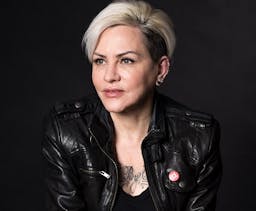What is a Feminist Entrepreneur? And Are You One?
Apr 28, 2022
Story
While feminism comes in more than 50 shades, most would agree that the unifying concept that underpins all variants is the belief that a better world happens when we can achieve equality of opportunity and inclusion for everyone as their authentic selves.
Entrepreneurship also comes in many shades, but for some reason, the entrepreneurship ecosystem and its attending start-up culture seems to be fixated on one, namely the creation of high-growth, scalable STEM-based enterprises(science, technology, engineering and math) that are usually founded and run by men. If you find this surprising, you might also want to consider these facts:
- According to a 2014 study published by theNational Academy of Sciences, investors prefer pitches by men, particularly attractive men, to those by women even when the content of the pitch is the same.
- An estimated 80 per cent or more of public funding being spent on entrepreneurship education and early-stage venture development are in male-dominated sectors like new technology, basic science, and manufacturing.Only 20 per cent or less are spent on industries dominated by women entrepreneurssuch as services and creative sectors.
- TheDMZ(Ryerson University's start-up incubator program) is ranked the thirdbest incubator in the world and has hosted more than230 start-ups over the past fiveyears with a collective $140 million in seed funding. However, only 20 per cent of these start-ups were led by women. Among allthese companies, the total number of women, including co-founders and staff, represent just 26 per cent of the total head count.
- Ontario'sCampus-Led Acceleratorand OCEA provides morethan $20 million in taxpayer-based funding for university- and college-based programs but they are not required to report on gender balance. Industry sources agree that gender imbalance is a significant issue in the publicly funded incubation/accelerator system.
- In Canada, women-owned enterprises make up 13.5 per cent of all SMEs (53.8 per cent were owned by men and the rest were co-owned). Barriers to entry includedisproportionatefamily caregiving duties, access to funding for slower growth enterprises, and comparable business experience.
- Onlyfour per centof enterprises that generate more than $1 million in revenues inin Canada are women-owned, even thoughmore than30 per cent of women entrepreneurs want tosee their ventures grow to that level. However, access to growth capitalis limitedfor non-unicorn-type enterprises in sectors where women entrepreneurs predominate.
- Statistics show that while there is improvement, only four to seven per cent of venture funding goes to women-led, VC-ready ventures.
These statistics become even more of a concern when you consider the role that entrepreneurship and uneven wealth distribution plays in the globaleconomy.
Growing inequality is not news. Even in Canada where \"peace, order, and good governance\" is touted,the top one per cent of the population owns 25 per cent of thiscountry's wealth. Thisamount is greater than the total wealth held by the bottom 70 per cent (more than 24.5 million people). Growing inequality is a significant issue for entrepreneurship because it affects one's ability tosecure the capital required to launch a new venture,especially if your venture is not tech-sexy or extreme growth–oriented.
Other issues include the realization that precarious employment and the so called \"gig\" economy isthe new normal. Thegender wage gap stubbornly continues. There are fewer good jobs. So it's no wonder entrepreneurship is emerging as thefoundation of our new global economic and cultural reality.
It's true. Wewillallbe entrepreneurs at some point in our lives. But this dimensionof our economy is seriously out of balance. And this amounts to incredible unrealized social and economic potential.
If these statistics got your attention, and you find yourself wanting to see the entrepreneurship space re-balanced, then you are well on your way to becoming a feminist entrepreneur.
Feminist entrepreneurs are interested in examining the structural, social, and cultural systems that shape the start-up and SME (small- andmid-sized enterprises) space through a gender, inclusive, and diverselens. They look for solutions that will help create a moreequal-opportunity space where all entrepreneurial talent can thrive, regardless of gender, race, age, ableness, scale, or class.
Feminist entrepreneurs also work to better the world by improving the lives of women* and girls* (*defined in gender-expansive terms) by developing new products that serve this market (LunapadsandHerSwabfor example). They alsochoose to operate their companies in line with feminist values and spend some of their time as social activists in the entrepreneurship space.
Feminist values includeequality, inclusion, restoration of our environment, creating resilient communities, rethinking the distribution of caregiving and thelack of social and economic value placed on caregiving, reframing gender identity, and the dream of realizing and unleashing massive human potential by simply removing cultural and social barriers. These values and more don't just benefit women, they helpmen as well.
So we, and our children, will all be entrepreneurs at some point. As TedX speaker and celebrated authorChimimanda Ngozi Adichienotes, in these times \"we should all be feminists.\"
So, are you a feminist entrepreneur? Or a better question might be, how can you not be? ____________________________________________________________________
Petra Kassun-Mutch is the founder and publisher of the recently launched (Dec. 11, 2015) online magazine for feminist entrepreneurs calledLiisBeth. Also publisher of an ebookcalled \"I Don't Know How She* Does It\".




